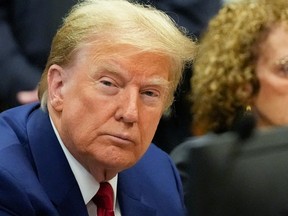Incoming U.S. president Donald Trump has promised an “America first” trade policy. We break down what it might mean for exporters, for importers and mobility at the Canada/U.S. border

Article content
The deeply protectionist “America first” trade agenda of U.S. president-elect Donald Trump has B.C. business groups casting a wary eye on the relationship the country has with its biggest export customer.
B.C.-based companies sell more than half of their exports to the U.S. — about $30.4 billion of the $56.2 billion export total in 2023 — and the province’s forestry sector is already subject to punishing softwood lumber tariffs in what is the biggest continuing trade dispute between the countries.
Advertisement 2
Article content
With Trump’s election campaign promising to levy “baseline tariffs” on U.S. imports to protect “American workers from unfair foreign competition,” local economist Jock Finlayson said, “At a minimum, we’re now faced with more uncertainty in terms of access to the U.S. market.”
On Wednesday, federal officials were quick to offer assurances that Ottawa is smoothing over its relationship with the new administration, with Finance Minister Chrystia Freeland vowing “with utter sincerity and conviction to Canadians that Canada will be fine.”
Trump’s promises, however — such as securing the U.S. border from illegal migration, protecting American industries with tariffs, and offering broad tax breaks to corporations and workers — have implications for how B.C.-based companies do business with our neighbours across the border.
On the border
Trump’s promise to “seal the border” and crack down on irregular migration into the U.S. is clearly aimed at the country’s southern border, but American policy expert Laurie Trautman said, “Canada is often the collateral damage of the U.S. pre-occupation with border security on the Mexican border.”
Article content
Advertisement 3
Article content
Trautman, director of the Border Policy Research Institute at Western Washington University, said the fear is that a big focus on securing the U.S.-Mexico border will bleed away the resources that U.S. Immigration and Customs Enforcement officials need to keep their northern border running smoothly.
That reduced capacity leads to longer wait times for people crossing the border, as well as delays in clearing commercial shipments, which is “where we get the border security concerns overlapping with economic concerns,” Trautman said.
She added that Trump’s first term taught both countries that his administration wasn’t interested in maintaining the border accord Canada had during the administrations of former president Barack Obama and former prime minister Stephen Harper to co-operate on common issues.
“I think the Canada-U.S. relationship was really damaged during the Trump years, and COVID didn’t help,” Trautman said. She fears how well it will survive “another four years, and potentially more, of an antagonistic relationship.”

For exports
The two countries are still bound by the Canada-U.S.-Mexico Agreement, the signature trade achievement of Trump’s first presidential term, noted trade advocate Maria Rajanayagam, which should ensure free trade.
Advertisement 4
Article content
“The pivotal point in that is the review date of 2026,” said Rajanayagam, chair of the Pacific chapter of the American Chamber of Commerce.
She added that with Canada being the biggest customer for 34 of America’s 50 states, “How important is it really going to be for the Trump presidency to impose tariffs on Canadian items?”
Finlayson, however, said if Trump’s Republican party can secure control of the U.S. House of Representatives, along with the Senate which it won Tuesday, he would have broad powers to overrule the Canada-U.S.-Mexico Agreement. At the very least, it isn’t certain a Trump administration wouldn’t let the agreement lapse in 2026.
“Everything we sell (would be subject to) possible 10-per-cent tariffs,” Finlayson said. “Lumber is already facing countervailing duties, but this would be on top of that, potentially.”
“So, natural gas, agri-food (products), machinery, equipment, minerals, metals,” Finlayson said.
More ominously, punitive tariffs would be a disincentive for those manufacturers of machinery and equipment to invest in B.C.-based expansion, according to Carlo Dade, a trade expert with the economic think-tank Canada West Foundation.
Advertisement 5
Article content
“The whole purpose of (Trump’s) global tariff is to … force companies to relocate jobs and manufacturing in the U.S. If that’s the American aim, we really can’t be helping them.”
For imports
Federal finance minister Freeland sidestepped questions about how Canada would react to protect Canadian exporters.
Trying to levy retaliatory tariffs would be a bad idea, according to Dade.
Last month, the Canadian Chamber of Commerce released a report warning that Trump’s tariffs would put a $30-billion-per-year dent in the Canadian economy and raise prices for Americans.
During Trump’s first term, Canada did retaliate against the U.S. when he imposed tariffs on Canadian steel and aluminum imports in 2018. However, in a scenario where Trump is levelling tariffs on a global basis, “retaliation makes things worse.”
“Theoretically, we could retaliate, but it would just make the damage worse for Canada,” Dade said.
With files from Canadian Press
Recommended from Editorial
Bookmark our website and support our journalism: Don’t miss the news you need to know — add VancouverSun.com and TheProvince.com to your bookmarks and sign up for our newsletters here.
You can also support our journalism by becoming a digital subscriber. With a subscription, you’ll get unlimited access to The Vancouver Sun online, as well as the ePaper and our app. Support us by subscribing today: The Vancouver Sun.
Article content




Comments